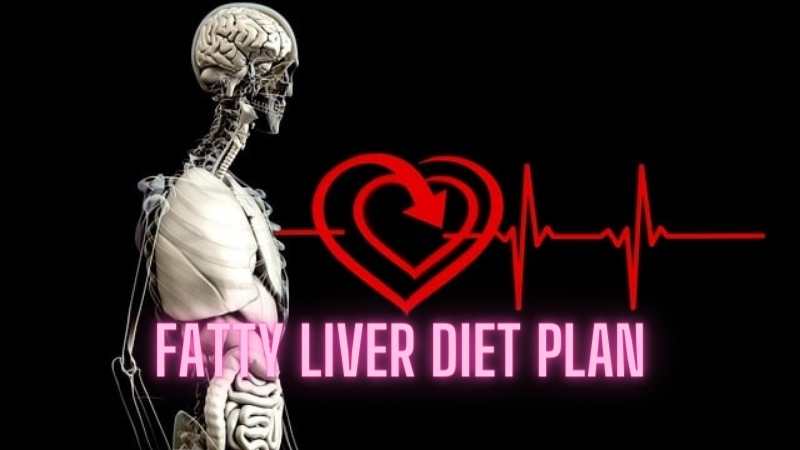We are committed to providing you with the latest and most accurate information on maintaining a healthy lifestyle. In this comprehensive guide, we will delve into the topic of fatty liver and provide you with a detailed diet plan to help improve your liver health. Our goal is to empower you with the knowledge to make positive changes and take control of your well-being.

Understanding Fatty Liver Disease
Fatty liver disease, also known as hepatic steatosis, is a condition characterized by an excessive buildup of fat in the liver. This can occur due to various factors, including excessive alcohol consumption, obesity, high cholesterol, and diabetes. If left untreated, fatty liver disease can progress to more severe conditions such as cirrhosis and liver failure.
The Role of Diet in Fatty Liver Disease
Diet plays a crucial role in the management and prevention of fatty liver disease. By making informed food choices, you can reduce the fat content in your liver and improve its overall function. Our diet plan focuses on nutrient-rich foods that promote liver health and eliminate those that may exacerbate the condition.
Best Thing to Eat for Breakfast: A Comprehensive Guide
- Emphasize Plant-Based Foods:
A plant-based diet forms the cornerstone of a fatty liver diet plan. Fruits, vegetables, whole grains, legumes, and nuts are loaded with essential vitamins, minerals, and antioxidants that support liver health. Incorporate a variety of colorful fruits and vegetables into your meals to ensure a diverse range of nutrients.
- Choose Healthy Protein Sources:
Protein is an essential component of a balanced diet, but it’s important to select healthy sources. Opt for lean meats such as skinless chicken, turkey, and fish like salmon and trout. Plant-based protein alternatives like tofu, tempeh, and legumes are excellent choices for vegetarian or vegan individuals.
- Limit Saturated and Trans Fats:
Saturated and Trans fats contribute to the accumulation of fat in the liver. Avoid processed and fried foods, as well as foods high in saturated fats like butter, cream, and fatty cuts of meat. Instead, opt for healthier fats found in sources like avocado, olive oil, and nuts.
- Reduce Added Sugar Intake:
High sugar consumption has been linked to fatty liver disease. Minimize your intake of sugary beverages, processed snacks, and desserts. Instead, satisfy your sweet tooth with natural alternatives like fresh fruits or homemade treats sweetened with stevia or other natural sweeteners.
- Moderate Alcohol Consumption:
Excessive alcohol consumption is a leading cause of fatty liver disease. If you have this condition, it is crucial to limit or avoid alcohol altogether. Speak to your healthcare provider for personalized guidance in managing alcohol intake.
- Stay Hydrated:
Proper hydration is vital for liver health. Aim to drink at least eight glasses of water per day to help flush out toxins and support overall liver function. Hydration also aids in maintaining a healthy weight and digestion.
- Regular Exercise:
Physical activity plays a significant role in liver health. Engaging in regular exercise not only helps control weight but also improves insulin sensitivity, reduces liver fat accumulation, and enhances overall well-being. Incorporate a mix of cardiovascular exercises, strength training, and flexibility exercises into your routine.
What is the best diet for fatty liver?
- Weight Management: If you are overweight or obese, losing weight can often improve fatty liver disease. A gradual, sustainable weight loss plan, which includes a combination of a balanced diet and regular physical activity, is typically recommended. However, rapid weight loss can sometimes worsen liver health, so it’s crucial to do this under medical supervision.
- Balanced Diet: A well-balanced diet can help manage fatty liver disease. Focus on whole, unprocessed foods, including:
- Fruits and Vegetables: Incorporate a variety of colorful fruits and vegetables for their antioxidants and fiber.
- Whole Grains: Choose whole grains like brown rice, quinoa, and whole wheat bread over refined grains.
- Lean Proteins: Opt for lean protein sources such as skinless poultry, fish, tofu, and legumes.
- Healthy Fats: Include sources of healthy fats like avocados, nuts, seeds, and olive oil while limiting saturated and trans fats.
- Limit Sugar: Minimize your intake of added sugars, sugary drinks, and high-fructose corn syrup.
- Portion Control: Be mindful of portion sizes to manage calorie intake.
- Limit Alcohol: If you have alcoholic fatty liver disease, it’s essential to abstain from alcohol completely.
- Low Sodium Diet: Reducing your sodium intake can help manage fluid retention and high blood pressure, which can be associated with liver disease. Avoid highly processed and salty foods.
- Avoid Rapid Weight Loss: As mentioned earlier, avoid crash diets or rapid weight loss plans, as they can harm the liver.
- Consider Supplements: Some studies suggest that certain supplements like vitamin E and omega-3 fatty acids may be beneficial for NAFLD. However, always consult with a healthcare provider before adding supplements to your diet.
- Regular Monitoring: Regularly monitor your liver function and follow-up with your healthcare provider to assess progress and make necessary adjustments to your diet and treatment plan.
Can I eat eggs with fatty liver?
Eggs are a good source of protein, vitamins, and minerals, and they can be a part of a balanced diet for many people, including those with fatty liver disease. However, there are some considerations to keep in mind:
Portion control: Consuming eggs in moderation is important because they contain cholesterol. While dietary cholesterol may not have as significant an impact on blood cholesterol levels as once thought, it’s still wise to be mindful of your overall cholesterol intake.
Preparation method: How you prepare eggs matters. Avoid cooking eggs with excessive amounts of added fats or oils, as this can contribute to unhealthy fat intake. Opt for cooking methods like boiling, poaching, or scrambling with minimal added fat.
🔥🔥Click here to follow US IT BARI-All about Healthy Foods site in Google News🔥🔥
Accompaniments: Be cautious about what you eat with eggs. For example, bacon and sausage are high in saturated fats, which may not be suitable for individuals with fatty liver disease. Consider pairing eggs with vegetables or whole grains for a more balanced meal.
Personalized advice: Everyone’s dietary needs and tolerances vary, so it’s crucial to consult with a healthcare provider or registered dietitian who can assess your individual condition and provide tailored dietary recommendations. They can help you create a diet plan that supports your liver health and overall well-being.
Can fatty liver eat wheat roti?
Portion Control: While wheat roti can be a healthy choice, it’s essential to watch your portion sizes. Overeating carbohydrates, even from whole grains, can contribute to weight gain, which is a risk factor for fatty liver disease.
Choose Whole Grains: Opt for whole wheat roti instead of those made from refined flour. Whole grains contain more fiber and nutrients, which can help with better blood sugar control and overall liver health.
Monitor Total Carbohydrate Intake: Be mindful of your overall carbohydrate intake, as excessive carbohydrates can lead to increased fat accumulation in the liver. Balancing your carbohydrate consumption with other nutrients like protein and healthy fats can be beneficial.
Consider Glycemic Index: Wheat roti has a lower glycemic index compared to some other carbohydrate sources, which means it has a slower impact on blood sugar levels. This can be helpful in managing blood sugar and insulin resistance, which are often associated with fatty liver disease.
Pair with Lean Protein and Vegetables: To create a well-rounded meal, accompany your wheat roti with lean sources of protein (e.g., chicken, fish, legumes) and plenty of non-starchy vegetables. This can help stabilize blood sugar levels and provide essential nutrients.
Limit Added Fats: Avoid excessive use of added fats like ghee or butter when making or consuming wheat roti, as excess fat intake can contribute to fatty liver disease.
Consult a Healthcare Professional: Everyone’s dietary needs are unique, and fatty liver disease can vary in severity. It’s essential to consult with a healthcare professional or a registered dietitian who can provide personalized dietary recommendations based on your specific condition and needs.
Which fruit removes fatty liver?
There is no single fruit that can remove fatty liver on its own. Fatty liver disease, also known as non-alcoholic fatty liver disease (NAFLD), is a complex condition that requires a multifaceted approach for treatment and management. It’s important to consult with a healthcare professional for personalized advice and a treatment plan tailored to your specific condition.
However, making healthy dietary choices, including incorporating certain fruits into your diet, can be a part of an overall strategy to improve liver health and manage fatty liver disease. Here are some fruits that can be beneficial:
- Berries (e.g., blueberries, strawberries, raspberries): Berries are rich in antioxidants and phytochemicals that can help reduce inflammation and oxidative stress, which can be beneficial for your liver.
- Citrus fruits (e.g., oranges, lemons, grapefruits): Citrus fruits are high in vitamin C, which has antioxidant properties and may support liver health.
- Apples: Apples contain fiber and antioxidants, which can contribute to overall health and potentially help with liver function.
- Avocado: While technically a fruit, avocados are high in healthy fats and can be part of a balanced diet that supports liver health.
- Papaya: Papaya is rich in vitamins, minerals, and antioxidants that can support overall health, including liver function.
It’s important to emphasize that dietary changes should be part of a comprehensive plan that includes maintaining a healthy weight, regular physical activity, limiting alcohol consumption (if applicable), and managing any underlying conditions that may contribute to fatty liver disease, such as diabetes or obesity.
Always consult with a healthcare provider or a registered dietitian before making significant dietary changes, especially if you have a medical condition like fatty liver disease, to ensure that your choices align with your specific needs and health goals.
Conclusion
In conclusion, a well-balanced and nutrient-rich diet, along with regular exercise, is crucial for managing and preventing fatty liver disease. By implementing our comprehensive fatty liver diet plan, you can take significant steps towards improving your liver health. Remember, consistency is key, and always consult with your healthcare provider before making any major dietary changes. Take control of your liver health today and embark on a journey towards a happier and healthier life.
Related Post
Best High Fat Foods That Offer Great Health Benefits
Health Benefits of Eating Strawberries
Health Benefits of Blueberries
Health Benefits of Avocados

All About Healthy Foods Content Writer With SEO Expert
 Ask us any question!
Ask us any question!

